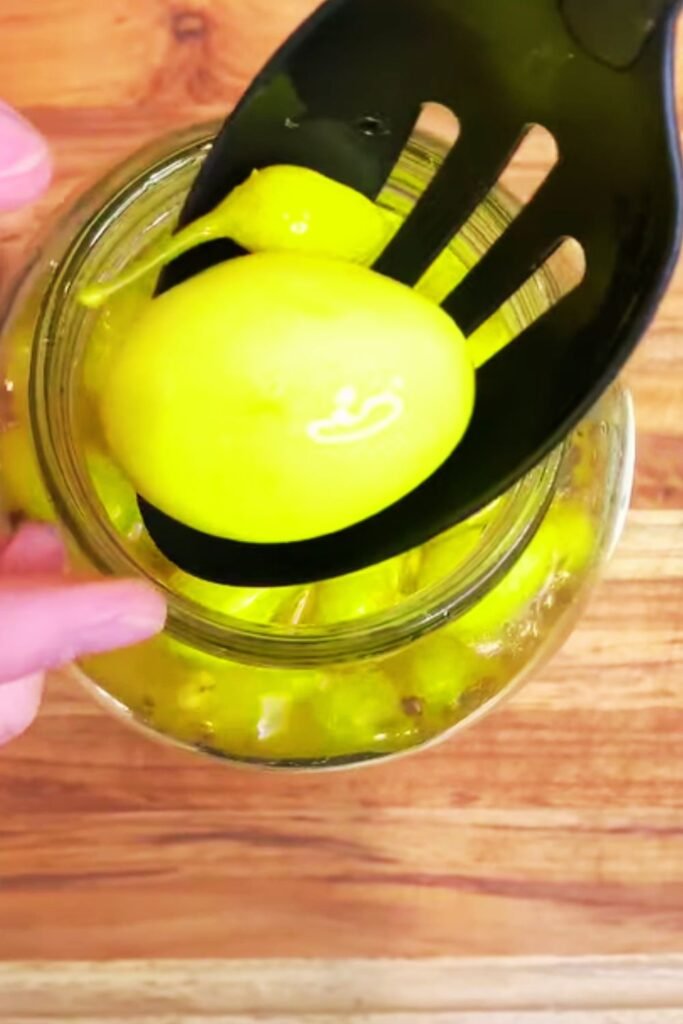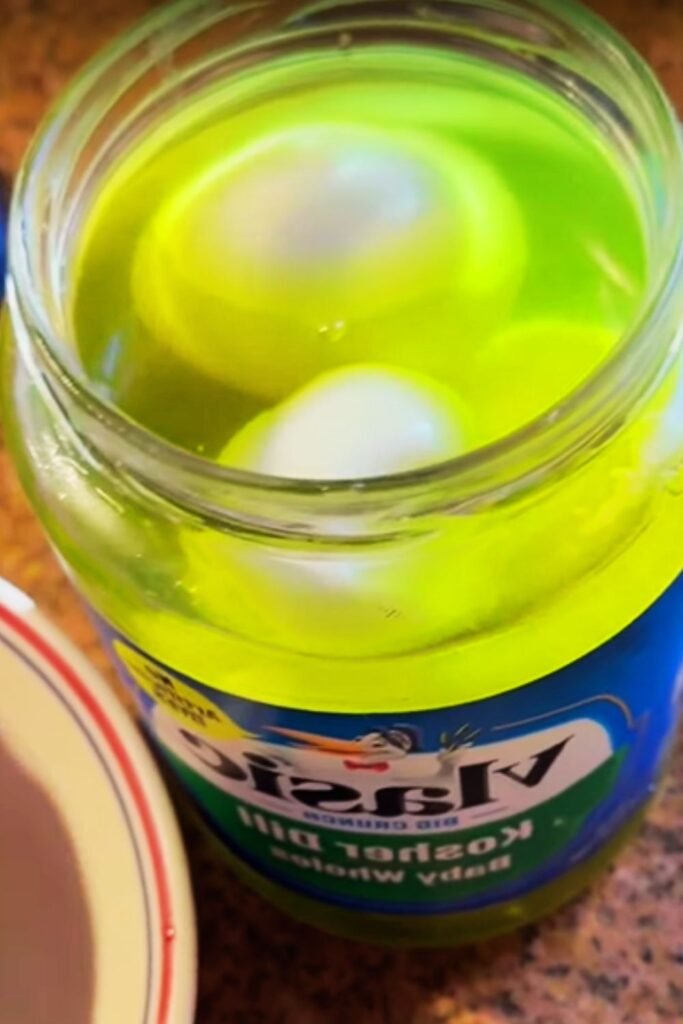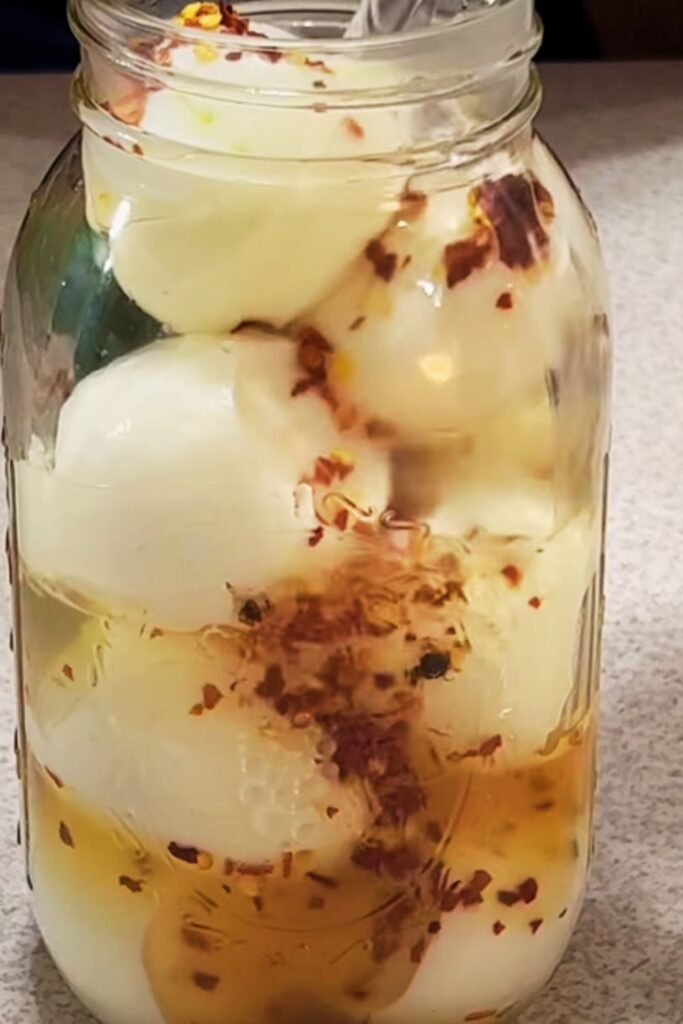There’s something magical about opening my grandmother’s old recipe box and finding that yellowed index card with her handwritten notes for pickled eggs. The ink has faded, but the memories remain crystal clear. I can still see her standing in the kitchen, carefully peeling hard-boiled eggs while the aromatic brine simmered on the stove. This isn’t just a recipe—it’s a connection to generations of home cooks who understood that good food takes time, patience, and love.
Pickled eggs have been a staple in American households for over a century, particularly in regions where preserving foods was essential for survival. My grandmother learned this recipe from her mother, who brought it from the old country. What makes this version special isn’t just the ingredients—it’s the technique, the timing, and those little secrets that only come from years of practice.
The Rich History Behind This Beloved Preserve
Pickled eggs emerged as a practical solution during times when refrigeration wasn’t available. Families needed ways to preserve protein-rich foods, and the acidic environment of vinegar provided the perfect preservation method. In my grandmother’s era, pickled eggs were often prepared in large batches during spring when hens were most productive.
The tradition spread throughout American communities, with each family adding their own twist. Some preferred a sweeter brine, others liked it spicy, and many incorporated regional ingredients. My grandmother’s version strikes the perfect balance—tangy enough to preserve the eggs properly, but with enough complexity to make each bite interesting.
Essential Ingredients for Authentic Pickled Eggs
The beauty of my grandmother’s recipe lies in its simplicity. She believed that quality ingredients spoke for themselves, and she was absolutely right. Here’s what you’ll need:
Fresh Eggs (12 large)
- Use eggs that are at least one week old
- Fresh eggs are harder to peel after boiling
- Room temperature eggs prevent cracking during cooking
White Vinegar (2 cups)
- Must be at least 5% acidity
- Provides the acidic environment for safe preservation
- Creates the signature tangy flavor
Water (1 cup)
- Filtered water produces clearer brine
- Tap water can cloud the final product
- Helps balance the acidity
Pickling Salt (2 tablespoons)
- Different from table salt
- Contains no additives that cloud brine
- Enhances flavor and aids preservation
Sugar (1 tablespoon)
- Balances the acidity
- Adds subtle sweetness
- Helps develop complex flavors
Whole Peppercorns (1 teaspoon)
- Black peppercorns for classic flavor
- Provides gentle heat
- Adds visual appeal
Bay Leaves (3-4 leaves)
- Contributes earthy, aromatic notes
- Traditional preserving herb
- Removes easily before serving
Garlic Cloves (3-4 cloves)
- Adds depth and complexity
- Provides mild antimicrobial properties
- Develops mellow flavor during pickling
Step-by-Step Instructions for Perfect Results
Preparing the Eggs
The foundation of great pickled eggs starts with perfectly cooked hard-boiled eggs. I’ve learned through countless batches that the cooking method makes all the difference.
Place your eggs in a large saucepan and cover with cold water by about two inches. This prevents cracking and ensures even cooking. Bring the water to a rolling boil over high heat, then immediately remove from heat and cover. Let the eggs sit in the hot water for exactly 12 minutes.
While the eggs cook, prepare an ice bath. Fill a large bowl with ice and cold water. This stops the cooking process immediately and makes peeling easier. After 12 minutes, transfer the eggs directly to the ice bath using a slotted spoon.
Once the eggs are completely cool, gently crack the shells and peel under running water. The water helps separate the membrane from the white, resulting in smooth, beautiful eggs. Pat each egg dry with paper towels before placing them in your pickling jar.

Creating the Perfect Brine
The brine is where my grandmother’s recipe truly shines. In a medium saucepan, combine the white vinegar, water, pickling salt, and sugar. Bring this mixture to a boil, stirring until the salt and sugar completely dissolve.
Add the peppercorns, bay leaves, and garlic cloves to the boiling brine. Reduce heat and simmer for 5 minutes. This allows the spices to infuse their flavors into the liquid. The aroma filling your kitchen will transport you back to simpler times.
Remove the brine from heat and let it cool for about 10 minutes. The liquid should still be warm when you pour it over the eggs, but not boiling hot, which could cause the eggs to become rubbery.
Assembly and Storage
Select clean glass jars with tight-fitting lids. Mason jars work perfectly for this recipe. Arrange the peeled eggs in the jars, leaving about an inch of headspace at the top.
Pour the warm brine over the eggs, ensuring they’re completely submerged. The eggs must be covered by at least half an inch of liquid for proper preservation. If needed, add more vinegar to achieve proper coverage.
Wipe the jar rims clean and secure the lids. Allow the jars to cool to room temperature before refrigerating. This gradual cooling prevents the glass from cracking and helps the flavors meld properly.
Nutritional Benefits and Health Considerations
| Nutrient | Per Egg | Daily Value % |
|---|---|---|
| Protein | 6.3g | 13% |
| Vitamin B12 | 0.6μg | 25% |
| Selenium | 15.4μg | 28% |
| Riboflavin | 0.3mg | 23% |
| Phosphorus | 99mg | 14% |
| Choline | 147mg | 27% |
| Folate | 24μg | 6% |
| Vitamin A | 244IU | 5% |
Pickled eggs offer impressive nutritional benefits while remaining relatively low in calories. Each egg contains approximately 78 calories, making them an excellent protein source for weight management. The pickling process doesn’t significantly alter the nutritional content of the eggs themselves.
The vinegar in pickled eggs may provide additional health benefits, including potential blood sugar regulation and digestive support. However, individuals with high blood pressure should monitor their sodium intake, as the pickling brine does contain salt.
Flavor Variations and Personal Touches
My grandmother’s base recipe serves as a perfect foundation for experimentation. Over the years, I’ve developed several variations that honor her original while adding my own creative touches.
Spicy Pickled Eggs: Add 2-3 jalapeño peppers and a teaspoon of red pepper flakes to the brine. The heat develops beautifully over time, creating eggs with a gentle kick that builds with each bite.
Sweet and Sour: Increase the sugar to 3 tablespoons and add a tablespoon of honey. This creates a more complex sweetness that balances perfectly with the vinegar’s acidity.
Herb Garden: Include fresh dill, thyme, and rosemary in the brine. These herbs create a garden-fresh flavor that’s particularly appealing during spring and summer months.
Beet Pickled Eggs: Add sliced cooked beets to the jar for stunning pink-colored eggs with earthy sweetness. This variation is as beautiful as it is delicious.
Storage Guidelines and Safety Tips
| Storage Method | Duration | Temperature | Notes |
|---|---|---|---|
| Refrigerator | 3-4 months | 35-40°F | Keep eggs submerged |
| Opened jar | 1 month | 35-40°F | Use clean utensils |
| Room temperature | Not recommended | N/A | Risk of spoilage |
| Freezer | Not recommended | N/A | Changes texture |
Proper storage is crucial for both safety and quality. Always keep pickled eggs refrigerated and ensure they remain completely submerged in brine. Use clean utensils when removing eggs to prevent contamination.
Signs of spoilage include cloudy brine, off odors, or slimy texture. When in doubt, discard the entire batch. The acidic environment inhibits harmful bacteria growth, but proper handling remains essential.

Serving Suggestions and Pairings
Pickled eggs shine in numerous culinary applications. I love serving them sliced on fresh rye bread with a touch of mustard and crisp lettuce. They make excellent additions to chef salads, providing both protein and tangy flavor.
For entertaining, arrange halved pickled eggs on a platter with crackers, aged cheese, and olives. This creates an appealing appetizer that sparks conversation about family traditions and heritage recipes.
Chopped pickled eggs elevate potato salad, adding complexity and visual interest. They’re also fantastic in deviled egg preparations, where the pickle flavor adds an unexpected twist to the classic dish.
Troubleshooting Common Issues
Cloudy Brine: Usually caused by using table salt instead of pickling salt, or hard water. Use filtered water and proper pickling salt for clear brine.
Rubbery Eggs: Overcooking or adding boiling brine causes this texture. Follow timing precisely and allow brine to cool slightly before adding.
Weak Flavor: Insufficient pickling time or low-acid vinegar. Ensure vinegar is at least 5% acidity and allow proper curing time.
Cracked Eggs: Starting with cold eggs in hot water causes cracking. Begin with room temperature eggs and gradual heating.
The Perfect Timing for Flavor Development
| Time Period | Flavor Profile | Best Use |
|---|---|---|
| 24 hours | Mild, fresh | Light snacking |
| 1 week | Developing tang | Salads, appetizers |
| 2-3 weeks | Full flavor | Peak enjoyment |
| 1 month | Mature, complex | Gourmet applications |
| 2+ months | Very tangy | Condiment use |
Patience is perhaps the most important ingredient in this recipe. While you can eat the eggs after 24 hours, the flavors truly develop over time. I find that two to three weeks produces the perfect balance of tang and egg flavor.
Seasonal Considerations and Batch Planning
Spring is traditionally the best time for making pickled eggs, when hens are most productive and eggs are plentiful. I like to prepare large batches during Easter season, when eggs are abundant and reasonably priced.
Summer picnics and barbecues provide perfect opportunities to showcase pickled eggs. They travel well and don’t require heating, making them ideal for outdoor entertaining.
During fall and winter, pickled eggs become comfort food, reminding us of preserved harvests and family gatherings. They pair beautifully with hearty soups and stews during colder months.
Equipment and Tools for Success
Investing in proper equipment makes the process smoother and more enjoyable. Heavy-bottomed saucepans distribute heat evenly, preventing hot spots that can affect brine quality. A large slotted spoon makes egg handling easier and safer.
Quality glass jars with tight-fitting lids are essential for proper storage. Mason jars are my preference, as they’re designed for food preservation and create an airtight seal.
A fine-mesh strainer helps remove any sediment from the brine, ensuring clarity and visual appeal. While not essential, it’s a small detail that elevates the final product.

Cultural Significance and Family Traditions
Pickled eggs represent more than just preserved food—they’re a connection to our past and a gift to future generations. In my family, making pickled eggs has become a cherished tradition that brings us together in the kitchen.
I’ve taught my children this recipe, watching them carefully peel eggs and measure spices. These moments create lasting memories and ensure that my grandmother’s legacy continues through another generation.
The recipe has evolved slightly over the years, with each family member adding their own touch while maintaining the essential character that makes it special. This evolution reflects the living nature of family recipes—they grow and adapt while preserving their core identity.
Questions and Answers
Q: How long do pickled eggs need to cure before eating? I recommend waiting at least 48 hours for the initial flavors to develop, but the eggs truly shine after one week. The vinegar needs time to penetrate the eggs and create that perfect balance of tangy and creamy textures.
Q: Can I reuse the pickling brine for another batch? While it’s technically possible, I don’t recommend it. The brine loses potency after the first use, and food safety concerns make fresh brine the better choice. However, you can use leftover brine as a flavorful addition to salad dressings or marinades.
Q: What’s the best way to peel hard-boiled eggs easily? Start with eggs that are at least one week old—fresh eggs are notoriously difficult to peel. After cooking, immediately plunge them into an ice bath and peel under running water. The water helps separate the membrane from the white.
Q: Why do my pickled eggs turn rubbery? This usually happens when eggs are overcooked or when boiling brine is poured directly over them. Cook eggs for exactly 12 minutes, then let them sit in hot water. Allow the brine to cool slightly before adding to the eggs.
Q: Can I make pickled eggs without sugar? Absolutely! The sugar balances the acidity and adds subtle sweetness, but it’s not essential for preservation. You can omit it entirely or substitute with honey for a different flavor profile.
Q: How do I know if my pickled eggs have gone bad? Look for cloudy brine, off odors, or slimy texture on the eggs. Properly made and stored pickled eggs should maintain clear brine and firm texture throughout their storage life.
Q: Can I add vegetables to the jar with the eggs? Yes! Onions, carrots, and beets make excellent additions. They pickle alongside the eggs and add color and flavor complexity. Just ensure everything remains submerged in brine.
Q: What type of vinegar works best for pickling eggs? White vinegar is traditional and produces the clearest brine. Apple cider vinegar creates a slightly different flavor profile and golden color. Avoid flavored vinegars, as they can overwhelm the egg flavor.
Q: Is it safe to can pickled eggs for long-term storage? Home canning of pickled eggs isn’t recommended due to their low acid content. The eggs themselves don’t acidify enough for safe canning. Always store pickled eggs in the refrigerator for maximum safety.
Q: Can I cut the eggs before pickling? While possible, whole eggs maintain better texture and appearance. If you prefer halved eggs, cut them just before serving rather than before pickling to prevent the yolks from becoming too firm.
This recipe has been a cornerstone of my family’s culinary tradition for generations. Each batch I make connects me to my grandmother’s wisdom and love, while creating new memories with my own family. The simple act of preserving eggs in vinegar becomes a meditation on tradition, patience, and the enduring power of good food to bring people together.
Whether you’re looking to preserve excess eggs, create a unique appetizer, or simply connect with time-honored cooking methods, this recipe delivers on all fronts. Take your time, follow the steps carefully, and most importantly, enjoy the process. Your patience will be rewarded with perfectly pickled eggs that would make any grandmother proud.